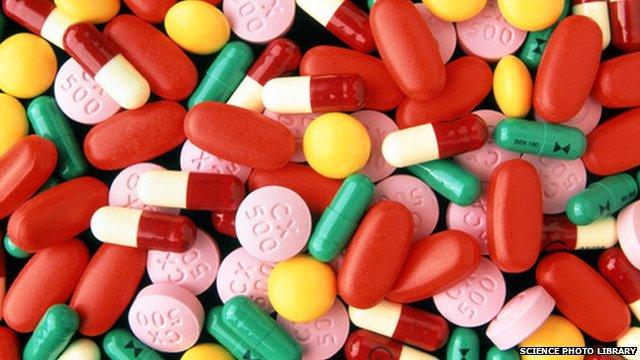Viewpoints: Finding new antibiotics
- Published

Antibiotics: Wonder drugs with an Achilles heel?
The prime minister has called for global action to tackle the threat of resistance to antibiotics. In a BBC interview, David Cameron will announce a review to identify why the market has failed to deliver new drugs and to formulate proposals to take to the G7 next year. Below are two viewpoints on the issue.
Peter Taylor, Professor of Microbiology, UCL School of Pharmacy
Antibiotics are probably the safest and most efficacious drugs ever produced but they have an Achilles heel.
Every time we use an antibiotic it alters the levels of bacteria out there in the environment and engenders resistance in a way that is very similar to Darwinian natural selection.
In fact what we are seeing is evolution in speeded-up time so antibiotic resistance can develop very quickly.
The industry was very good at developing new antibiotics during the so-called golden age of antibiotic discovery during the late forties up to the mid 1980s.
But since then for various reasons there has been a lack of investment and a lack of success in finding new drugs.
I think we can apply new technologies for a new phase of antibiotic drug discovery.
We are trying to take a different approach - to disarm the bacteria - modify them in such a way that they are no longer able to cause infection and this strategy does work, we have shown this in a number of models of infection.
We found that some components in Japanese green tea are able to insert into the membranes of strains of MRSA - the superbug which causes very many lethal infections in hospitals.
It basically converts the bacteria from being fully resistant to our front line drugs - the cephalosporin's and the penicillin's - to make them become completely susceptible to these drugs.
The idea is we can use these agents alongside conventional drugs that have lost their utility because of the emergence of resistance.
Patrick Vallance, President of R&D, GlaxoSmithKline
There are three basic problems - one is it is actually really difficult to discover new antibiotics; it is not a trivial exercise.
Bacteria kick out chemicals - that is what they do, they live in a toxic environment. Second, is it is difficult to do clinical trials, it is difficult to operationalise those in hospitals, and the third is there is a big economic disincentive in a way.
We have got a couple of drugs in development going through late stage clinical trials so we are excited about that.
I am not going to stand here and say we have a great pipeline coming through which is going to solve this problem because we haven't, and nobody has, and there needs to be more effort here.
We've spent something like a $1bn over the last 10-12 years on antibiotic research and development. We have one drug come through for skin infections which is licensed and a couple in the late stage pipeline now and we've got some earlier things but you know that's a lot of money to spend.
Antibiotics if they come through get very low pricing so we don't expect a great return on investment for that money that we have spent.
I think part of the problem is that in society people are prepared to pay quite a lot of money for cancer drugs - some of the prices are up in the hundreds of thousands of pounds a year type price range.
New antibiotics as compared with an old antibiotic? Pennies. So the price is very different for the two and of course it is a very short treatment duration very often but it can have equally big effects so there is this disparity in how society values the two types of medicines.
- Published2 July 2014